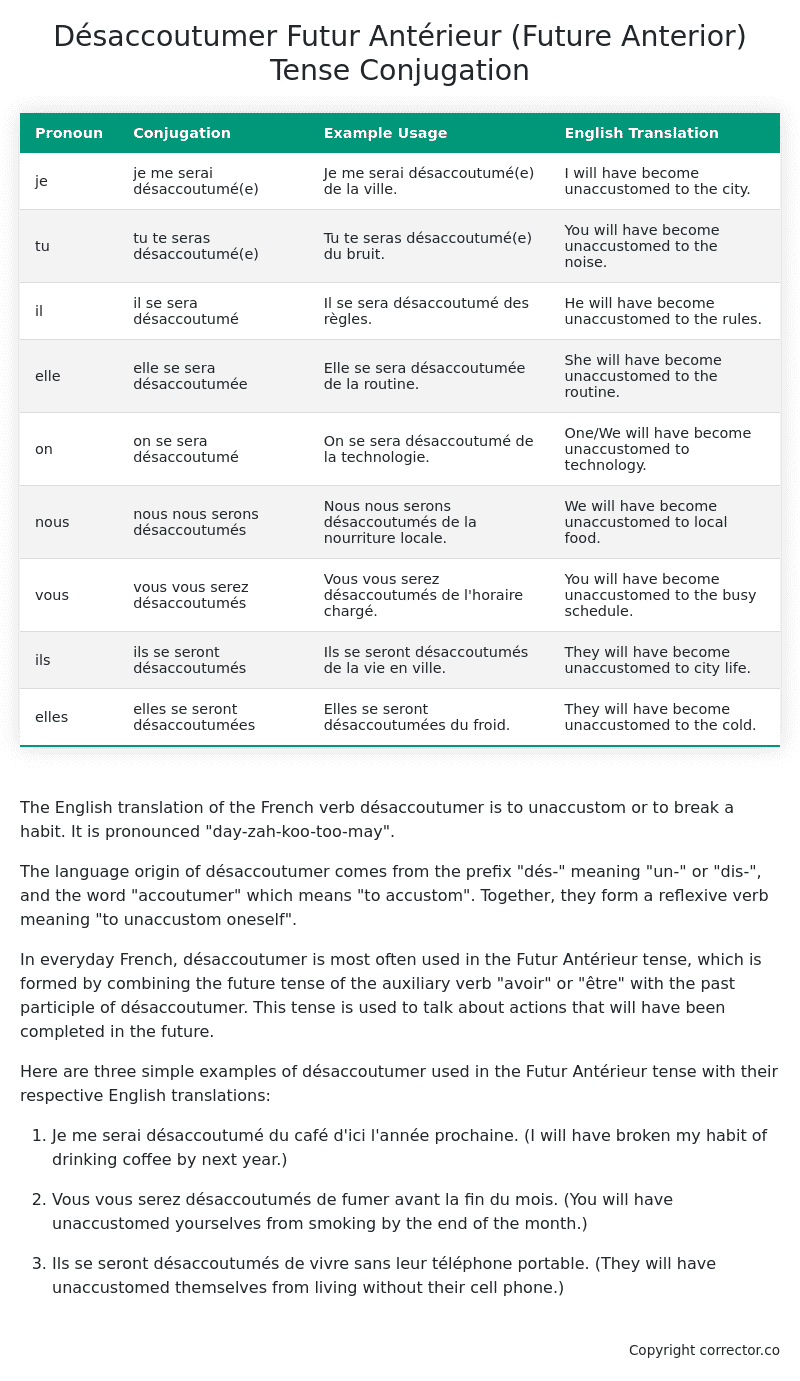Futur Antérieur (Future Anterior) Tense Conjugation of the French Verb désaccoutumer
Introduction to the verb désaccoutumer
The English translation of the French verb désaccoutumer is to unaccustom or to break a habit. It is pronounced “day-zah-koo-too-may”.
The language origin of désaccoutumer comes from the prefix “dés-” meaning “un-” or “dis-“, and the word “accoutumer” which means “to accustom”. Together, they form a reflexive verb meaning “to unaccustom oneself”.
In everyday French, désaccoutumer is most often used in the Futur Antérieur tense, which is formed by combining the future tense of the auxiliary verb “avoir” or “être” with the past participle of désaccoutumer. This tense is used to talk about actions that will have been completed in the future.
Here are three simple examples of désaccoutumer used in the Futur Antérieur tense with their respective English translations:
-
Je me serai désaccoutumé du café d’ici l’année prochaine. (I will have broken my habit of drinking coffee by next year.)
-
Vous vous serez désaccoutumés de fumer avant la fin du mois. (You will have unaccustomed yourselves from smoking by the end of the month.)
-
Ils se seront désaccoutumés de vivre sans leur téléphone portable. (They will have unaccustomed themselves from living without their cell phone.)
Table of the Futur Antérieur (Future Anterior) Tense Conjugation of désaccoutumer
| Pronoun | Conjugation | Example Usage | English Translation |
|---|---|---|---|
| je | je me serai désaccoutumé(e) | Je me serai désaccoutumé(e) de la ville. | I will have become unaccustomed to the city. |
| tu | tu te seras désaccoutumé(e) | Tu te seras désaccoutumé(e) du bruit. | You will have become unaccustomed to the noise. |
| il | il se sera désaccoutumé | Il se sera désaccoutumé des règles. | He will have become unaccustomed to the rules. |
| elle | elle se sera désaccoutumée | Elle se sera désaccoutumée de la routine. | She will have become unaccustomed to the routine. |
| on | on se sera désaccoutumé | On se sera désaccoutumé de la technologie. | One/We will have become unaccustomed to technology. |
| nous | nous nous serons désaccoutumés | Nous nous serons désaccoutumés de la nourriture locale. | We will have become unaccustomed to local food. |
| vous | vous vous serez désaccoutumés | Vous vous serez désaccoutumés de l’horaire chargé. | You will have become unaccustomed to the busy schedule. |
| ils | ils se seront désaccoutumés | Ils se seront désaccoutumés de la vie en ville. | They will have become unaccustomed to city life. |
| elles | elles se seront désaccoutumées | Elles se seront désaccoutumées du froid. | They will have become unaccustomed to the cold. |
Other Conjugations for Désaccoutumer.
Le Present (Present Tense) Conjugation of the French Verb désaccoutumer
Imparfait (Imperfect) Tense Conjugation of the French Verb désaccoutumer
Passé Simple (Simple Past) Tense Conjugation of the French Verb désaccoutumer
Passé Composé (Present Perfect) Tense Conjugation of the French Verb désaccoutumer
Futur Simple (Simple Future) Tense Conjugation of the French Verb désaccoutumer
Futur Proche (Near Future) Tense Conjugation of the French Verb désaccoutumer
Plus-que-parfait (Pluperfect) Tense Conjugation of the French Verb désaccoutumer
Passé Antérieur (Past Anterior) Tense Conjugation of the French Verb désaccoutumer
Futur Antérieur (Future Anterior) Tense Conjugation of the French Verb désaccoutumer (this article)
Subjonctif Présent (Subjunctive Present) Tense Conjugation of the French Verb désaccoutumer
Subjonctif Passé (Subjunctive Past) Tense Conjugation of the French Verb désaccoutumer
Subjonctif Imparfait (Subjunctive Imperfect) Tense Conjugation of the French Verb désaccoutumer
Conditionnel Présent (Conditional Present) Tense Conjugation of the French Verb désaccoutumer
Conditionnel Passé (Conditional Past) Tense Conjugation of the French Verb désaccoutumer
L’impératif Présent (Imperative Present) Tense Conjugation of the French Verb désaccoutumer
L’infinitif Présent (Infinitive Present) Tense Conjugation of the French Verb désaccoutumer
Struggling with French verbs or the language in general? Why not use our free French Grammar Checker – no registration required!
Get a FREE Download Study Sheet of this Conjugation 🔥
Simply right click the image below, click “save image” and get your free reference for the désaccoutumer Futur Antérieur tense conjugation!

Désaccoutumer – About the French Futur Antérieur (Future Anterior) Tense
Construction
Common Everyday Usage Patterns
Interactions with Other Tenses
For example
Summary
I hope you enjoyed this article on the verb désaccoutumer. Still in a learning mood? Check out another TOTALLY random French verb conjugation!


